Energy&Economy
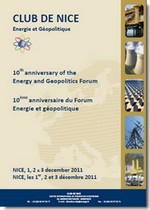 The “Club de Nice” has been initiated by request of the City of Nice and is run by the Institut Europeen des Hautes Etudes Internationales in cooperation with the Russian Academy of Sciences and the Centre de Recherches Enttreprises et Societes of Geneva. Its main goal is to offer public and private leaders in the field of energy a regular place to meet and discuss their specific problems in a constantly changing world.
The “Club de Nice” has been initiated by request of the City of Nice and is run by the Institut Europeen des Hautes Etudes Internationales in cooperation with the Russian Academy of Sciences and the Centre de Recherches Enttreprises et Societes of Geneva. Its main goal is to offer public and private leaders in the field of energy a regular place to meet and discuss their specific problems in a constantly changing world.
The work conducted as usual in partnership with the Russian Academy of Sciences bears upon the main topic global energy themes and the impact of their development on energy policy in Europe and Russia.
Forum December 1-3, 2011
Thursday, 1 December, 2011
3.30‐4.00 pm Opening session
Chairman: M. Valery KOSTIOUK, Secretary General of the Russian Academy of Sciences.
4.00‐5.00 pm Keynote speech
5.00‐6.00 pm Presentation of « Geopolitics of Energy », a book co‐produced by the Russian Academy of Sciences and Club de Nice Energie & Geopolitique.
Friday, 2 December, 2011
9.00‐11.00 am Round table 1: Oil and gas: producing countries and political risks The events that marked most Southern Mediterranean and Middle Eastern countries in 2011 revived the debate on the high political risks in international energy relations. Such risks are particularly high for European countries, obviously, as they rely heavily on external sources. What impact does this have on their basic energy policy decisions? Above and beyond national policies to diversify sources and suppliers, can a European approach be envisaged? Are solidarity mechanisms ‐ as in matters of finance ‐ conceivable? What lessons can be learnt for relations with Russia?
11.00 am‐1.00 pm Round table 2: Public action and energy policy The recent catastrophes at Deep Water Horizon and in Fukushima have raised the question once again of the compatibility of the interests of private companies with those of society in general. Today more than ever, defining and implementing an energy policy would seem to call for compromise. Given the power of the companies ‐ which knows no borders ‐, and the different levels of public regulation (local, national and international), what kind of control is possible?
2.30‐4.30 pm Round table 3: What future for nuclear power? The Fukushima catastrophe was widely covered in the media, triggering a tidal wave of emotion all over the world. At the very time when nuclear power seemed to be taking off again, Fukushima caused decisions that had already been taken to be hastily reconsidered and occasionally overturned. A scientific, technical, economic and political debate on nuclear power and on the conditions for harnessing it is now vital, particularly for Europe and Russia.
4.30‐6.30 pm Round table 4: Energy efficiency and partnership in the Europe‐Russia dialogue Russia has a lot to gain from better energy efficiency, both in terms of the energy savings that could result (several hundred million TOE between now and 2020 according to the European Commission) and in infrastructure investments required for developing a suitable policy (over 700 billion euros according to the same source). In a policy document entitled “Energy Strategy to 2020”, Russia has embraced this challenge as one of its major objectives. It also constitutes a key topic in energy discussions with the European Union. Extending the partnership in this field emerges as a jointly beneficial priority.
7.00 pm Reception
Saturday, 3 December, 2011
9.00‐11.00 am Round table 5: Energy and Mediterranean cooperation For those who live on its shores, and in particular for Europeans, the Mediterranean is becoming the linchpin in energy security policy. Over 30% of Europe’s consumption has traditionally transited through the Mediterranean, and this role is set to develop with increased gas imports from Central Asia and Russia, extensions to oil and gas pipeline networks in the zone, and growing methane traffic (Algerian, Libyan and Nigerian LNG heading for Europe). This evolution is of major importance to Russia; the country is not only a keen observer, but also a key player. Furthermore, the complementary nature of energy interests in the South with its exports, and in the North as a natural client out of necessity, opens avenues for cooperation in line with global tendencies towards energy diversification. Projects such as “Désertec” (for the mass production of solar energy in the Sahara), and “Transgreen”, now called “Medgrid” (to carry that solar energy to Europe via the Mediterranean), are part of the Union for the Mediterranean’s “Solar Plan”.
11.00‐12.30 am Summary of debates. Conclusions.
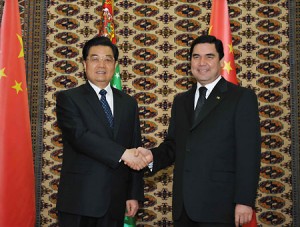 Relations between Turkmenistan and China are long-term and strategic. “These relations stood the test of time, proven their efficiency and now are a major factor of stability and development in the Eurasian space,” President Gurbanguly Berdimuhammadov said in an interview before his official visit to Beijing.
Relations between Turkmenistan and China are long-term and strategic. “These relations stood the test of time, proven their efficiency and now are a major factor of stability and development in the Eurasian space,” President Gurbanguly Berdimuhammadov said in an interview before his official visit to Beijing.
In December 2009 Turkmenistan-China gas pipeline was commissioned. “This is an outstanding event. This project is of strategic importance for both sides, meets long-term interests of Turkmenistan and China, as well as logic of global economic development, in which energy supplies play an increasing role,” Berdimuhammadov told Chinese journalists.
The Turkmen leader stressed that Ashgabat jointly with Chinese partners is working on further increase in the supply of Turkmen gas to Beijing in view of increasing demands in China’s economy and great opportunities of Turkmenistan’s resource base. “China is not just a huge and great country, a powerful global economic and industrial centre, a vast and promising market for Turkmenistan. It is a reliable and trusted friend,” Berdimuhammadov highlighted.
At the same time China is ready to work with Turkmenistan to create a good environment for their business cooperation. Cooperation between the two countries has seen achievement in economic, trade, energy, transportation and other fields in recent years, Chinese Vice Premier Wang Qishan told at a business forum.
In last weeks Ashgabat issued an angry response to Russian scepticism over the size of its natural gas reserves and reinforced its ambition to find new energy markets in Asia and Europe that will cut its dependence on the Kremlin. BP data ranks natural gas reserves in Turkmenistan, a Central Asian nation of 5.4 million, as the world’s fourth-largest. The country is seeking alternative export routes to meet its goal of more than tripling natural gas output by 2030.
Auditor Gaffney, Cline & Associates has ranked the South Iolotan natural gas field as the world’s second-largest after South Pars in Iran, saying last month it could contain between 13.1 trillion and 21.2 trillion cubic metres. But Alexander Medvedev, deputy chief executive of Russian gas export monopoly Gazprom, called these estimates into question. “I believe that there are no grounds … and no reason to make such statements that there is such a natural deposit with reserves of this scale,” Medvedev said.
Ashgabat, at odds with Moscow over its plans to export gas to Europe, issued a strongly worded statement, expressing “bewilderment over the biased assessment by a professional” and calling Gazprom‘s remarks “utterly tactless”. Turkmenistan has expanded gas exports to next-door Iran and launched a pipeline to China. It has also won strong support from the European Union and the United States for plans to supply gas to a trans-Caspian pipeline that will run to Europe via Azerbaijan.
Turkmenistan’s annual natural gas output is estimated to have averaged around 70 billion cubic metres in the 20 years of independence from the Soviet Union. Turkmenistan aims to produce 230 bcm of the fuel annually by 2030.
(Sources – Xinhua, Reuters, Trend)
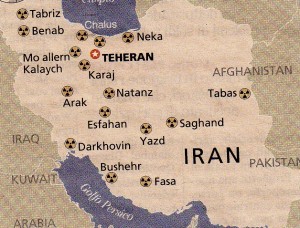 La Russia è fortemente preoccupata per la situazione nel Golfo Persico. La sua diplomazia si muove per evitare l’irreparabile. Il rischio di una nuova guerra è alto. Un attacco israeliano all’Iran “sarebbe un errore molto grave dalle conseguenze imprevedibili”, ha sottolineato Serghej Lavrov. Serve, ha spiegato il ministro degli Esteri russo, una decisa iniziativa per tornare al tavolo dei negoziati ed uscire dall’attuale vicolo cieco. Il monito di Mosca giunge, quando pare che un’azione militare dei cacciabombardieri con la stella di Davide contro una decina di installazioni atomiche iraniane sia ormai questione di ore.
La Russia è fortemente preoccupata per la situazione nel Golfo Persico. La sua diplomazia si muove per evitare l’irreparabile. Il rischio di una nuova guerra è alto. Un attacco israeliano all’Iran “sarebbe un errore molto grave dalle conseguenze imprevedibili”, ha sottolineato Serghej Lavrov. Serve, ha spiegato il ministro degli Esteri russo, una decisa iniziativa per tornare al tavolo dei negoziati ed uscire dall’attuale vicolo cieco. Il monito di Mosca giunge, quando pare che un’azione militare dei cacciabombardieri con la stella di Davide contro una decina di installazioni atomiche iraniane sia ormai questione di ore.
Almeno è questo che si è desunto dalle parole chiarissime del presidente israeliano Shimon Peres, che parla di “attacco probabile”. L’’Aiea, l’agenzia internazionale per il controllo dell’energia atomica, ha appena pubblicato un rapporto sull’Iran. Alcuni suoi stralci erano stati, però, già resi noti da un quotidiano statunitense nei giorni scorsi.
Teheran si sarebbe presa gioco della comunità internazionale e le sanzioni della Nazioni Unite non sarebbero servite a nulla. Le prove definitive sul carattere militare del programma atomico degli ayatollah sarebbero la creazione al computer di testate nucleari e le fotografie scattate dai satelliti di un enorme container di acciaio usato per test ad alta capacità esplosiva. In Russia si discute del ruolo chiave svolto dall’esperto “sovietico” Vjaceslav Danilenko, che avrebbe anche insegnato agli iraniani a sviluppare detonatori ad alta precisione. Con lui hanno collaborato al programma militare specialisti pakistani e nord coreani.
Un giornale russo ha tentato di identificare questo Vjaceslav Danilenko. Ve ne sono due – con identico nome e cognome, ma diverso patronimico – che lavorano in questo campo: uno ucraino, l’altro russo. L’ucraino ha negato di avere mai avuto rapporti con l’Iran. Il secondo, invece, avrebbe avuto contatti con Teheran negli anni Cinquanta. L’opinione diffusa a Mosca è che la fuga di notizie dagli Usa sia stata non casuale e che l’Iran non ha ancora sviluppato capacità militari.
Qualche mese fa la Russia, dopo anni di ritardi, ha consegnato la centrale atomica ad usi civili di Bushehr, la prima in funzione in Iran. Gli americani avevano espresso la loro contrarietà, ma Mosca ha fornito ampie rassicurazioni al riguardo.
Stando ad alcuni analisti militari gli Stati Uniti, ancora infuriati per il recente fallito complotto iraniano organizzato per uccidere l’ambasciatore saudita a Washington, potrebbero appoggiare l’azione israeliana dalle portaerei dislocate nel golfo Persico.
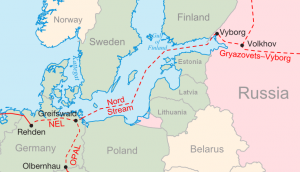 Il Sogno della Gazprom si è finalmente realizzato. Russia e Germania sono adesso unite da un gasdotto che evita il passaggio su territori dei riottosi vicini.
Il Sogno della Gazprom si è finalmente realizzato. Russia e Germania sono adesso unite da un gasdotto che evita il passaggio su territori dei riottosi vicini.
Il Nord Stream entra in funzione alla presenza del presidente russo Medvedev e del cancelliere tedesco Merkel. Il costo per costruire i 1223 chilometri di pipeline sotto al mar Baltico è stato di 8,8 miliardi di euro. Alcuni leader nazionalisti polacchi hanno definito questa megaopera tecnologica un nuovo “patto del diavolo” come quello tra Molotov e Ribbentrop dell’agosto 1939. Ma tutti i Paesi baltici in generale hanno espresso preoccupazione.
La Russia alleggerisce così la sua dipendenza dal transito attraverso l’Ucraina per rifornire i ricchi mercati europei. Il progetto gemello, il South Stream, sotto al mar Nero è ancora in fase di organizzazione. L’accordo per la realizzazione del Nord Stream è stato firmato nel 2005. Tra un anno verrà finito di costruire un secondo ramo. A pieno regime ognuno delle due condotte avrà una capacità di 27,5 miliardi di metri cubi l’anno.
Poland and its future in the eurozone.
2 Nov 2011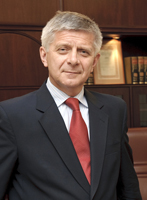 The prospect of Polish adoption of the euro became “clearer” after last summit of European leaders in Brussels. Polish central bank Governor Marek Belka is sure of it “even if we don’t want to name an entry date immediately.” The euro-area is moving toward closer political union, and Poland will “one day enter a new, different eurozone that carries the traits of a federation more than it does today,” said the Governor.
The prospect of Polish adoption of the euro became “clearer” after last summit of European leaders in Brussels. Polish central bank Governor Marek Belka is sure of it “even if we don’t want to name an entry date immediately.” The euro-area is moving toward closer political union, and Poland will “one day enter a new, different eurozone that carries the traits of a federation more than it does today,” said the Governor.
But a new poll finds that opinion continues to turn against adopting the single European currency. Fifty three percent of respondents told the OBOP pollsters that accession to the eurozone will be unfavourable for Poland.
Sixty five percent think that adopting the euro will have a negative impact on their household and 49 percent said they thought the single currency would have a negative effect on the economy. Only 22 percent thought the euro would be positive for the economy, 11 percent that it would have no effect and 18 percent answered “don’t know”. In 2007 the government said that they aimed to join the eurozone by 2012, but the finance crisis and debt levels forced to delay the plans.
Full Interview – Der Spiegel –
Belarussian average salaries in free fall.
26 Oct 2011“In Belarus, the nominal average monthly salary in January-September amounted to Br1.72 million, including for September – Br2.26 million (13.4% or Br267.8 thousand more than in August). This was reported by the National Statistics Committee. However, when Br1.72 million was equal to $570.48 at the rate of the National Bank on February 1, then on October 1 it made only Br304.96.
As for the rate of the extra session on the Belarussian Currency and Stock Exchange (BCSE), the above sum was only $225.43 on September 30. With regard to the size of the September salary at the rate of the National Bank, it was equal to $400.71 on October 1, while at the rate of the BCSE on September 30 – $296.2.
Real wages in rubles (adjusted to the growth of consumer prices of goods and services) for the first nine months of the year grew by 8.2%, while in September it fell by 0.2% compared with August.
Gross average salary of civil servants amounted to Br2.28 million in September, while in August – Br2.01 million.
According to statistics, the average September salary in the industry amounted to Br2.54 million, in construction – Br2.38 million, transport and communications – Br2.32 million, agriculture, forestry and hunting – Br1.54 million, education – Br1.93 million (teachers – Br2.14 million, the faculty – Br2.76 million).
Average earnings of medical and social workers made Br2.05 million. Health staff received an average of Br2.08 million, doctors – Br2.98 million, the nursing staff – Br2.02 million.
As Telegraf previously reported, followed by the BCSE extra session, held on September 14, the average salary decreased by $135 per day in the country.”
source: Telegraf.by
“Over the last 7 years (2007-13) only through the EU Cohesion Funds (the biggest in the EU’s regional assistance) the member states are supposed to receive about € 350bn attributed to more than 450 national and regional projects in the 27 member states. 
For example, in the Baltic States, Latvia will get € 4,6bn, Lithuania – € 6,9bn and Estonia – € 3,4bn; just to compare, Poland has got already € 67bn of the EU development grants since it joined the EU in 2004…
Over the next 18 months, the EU-27 governments will decide on the block’s next “financial programming” for 2014-20 with a total expenditures at the level of 1 trillion Euros… According to the Commission’s proposal published at the end of June 2011, the spending figures are the following (out of total € 1,025bn for the whole 2014-20 period) in %:
Economic growth & cohesion – 48;
Common agricultural policy – 27,5;
Other natural resources spending – 10;
Global action – 6,8;
Administration – 6,1;
Security & citizenship – 1,8.
Main contributors to the EU budget are known well: Germany, France, Italy, Sweden, the Netherlands, the UK and Denmark, which “donate” the lion share of the EU-27 budget. The main recipients are well known too: Poland, Greece, Belgium, Hungary, Portugal and the three Baltic States, though in much less degree…
The new EU member states from Eastern Europe are afraid that “milking the EU budget” through cohesion funds would come to an end. The Commission authorities argued that these worries were groundless: in the budget proposal the cohesion funds equal 37 per cent of the total budget (which is actually 2 per cent more that in the previous budget term).
However, some say, there are some grounds for assistance’s reduction, e.g. in the cohesion fund a new line of expenses is envisages, so–called “connectivity fund” of about € 40bn aimed to build cross-border infrastructure projects. In fact, these projects include high-speed railways and pipeline connections which might be of a primary benefit for the rich member states.
Besides some proposed changes in the eligibility rules for various EU funds would make in more difficult for poorer states to get financial support.
According to a Polish study, wealthy states can benefit from cohesion funds for the Eastern members: each euro in cohesion financing in Poland gives 36 cents to the richer states in the form of additional demand for goods and services. (Financial Times, 22 August 2011, p.5)…”
Article – Eugene Eteris – The Baltic Course.
Россия может проиграть весь Ближний Восток.
17 Oct 2011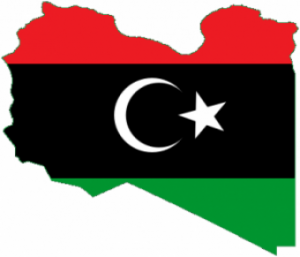 «Итальянцы не должны пустить русских в Ливию!» — вот суть конфиденциальных документов, написанных в апреле 2008 года послом США в Италии Рональдом Спольи. Сейчас, в период коварной борьбы за выгодные контракты в африканской стране среди иностранных государств-победителей, они каким-то образом попали в редакцию туринской газеты. В принципе в этих бумагах нет ничего неожиданного. Американцы и ряд европейских стран обеспокоены энергобезопасностью Старого Света и не доверяют России. Особенно теперь, когда уже ясно, кто будет сидеть в Кремле.
«Итальянцы не должны пустить русских в Ливию!» — вот суть конфиденциальных документов, написанных в апреле 2008 года послом США в Италии Рональдом Спольи. Сейчас, в период коварной борьбы за выгодные контракты в африканской стране среди иностранных государств-победителей, они каким-то образом попали в редакцию туринской газеты. В принципе в этих бумагах нет ничего неожиданного. Американцы и ряд европейских стран обеспокоены энергобезопасностью Старого Света и не доверяют России. Особенно теперь, когда уже ясно, кто будет сидеть в Кремле.
Реконструировать ливийский сценарий очень непросто — это мозаика не только со многими отсутствующими, но и с фальшивыми элементами. ….
Россия в апреле 2008 года списала долги Каддафи и поменяла их на некоторые выгодные контракты для своих компаний. Часть из соглашений — военная, и вряд ли она будет соблюдена новой властью Триполи. Также из-за своей позиции на протяжении гражданского конфликта 2011 года Москва наверняка окажется без явных союзников в Ливии и среди победителей.
Впрочем, большая ливийская игра только начинается. Пока превосходство в энергосекторе у ЭНИ (которая еще в 2006 году подписала соглашение о международном стратегическом партнерстве с «Газпромом»). Французы, британцы и американцы смотрят, наоборот, не столько на настоящие, сколько на огромные будущие возможности этой африканской страны. Эксперты предполагают, что ее запасы энергоресурсов в десять раз больше, чем предполагалось. Если это действительно так, то Ливия станет для Европы настоящим альтернативным поставщиком в конкуренции с Востоком. Вот в чем причина нежелания Вашингтона видеть русских в Триполи. Но нежелание — это одно, а что же в реальности?
В реальности, чтобы выиграть будущие международные тендеры в Ливии, надо в первую очередь гарантировать качество и надежность. А в этих вопросах у российских компаний часто возникали проблемы. Одно слово: конкурентоспособность. Популярные в вашей стране истории о том, что, мол, никто не любит Россию, на самом деле выдумки. При глобализации сфер влияния больше не существует. Просто, чтобы побеждать, надо быть лучшим.
Западные аналитики сейчас пытаются понять, какова внешняя политика России на Ближнем Востоке и ее отношение к «арабской весне». Пока это не очень ясно. Многих удивляют ошибки, которые допускает Россия, — сначала в Ливии, а теперь и в Сирии. Понятно, что Дамаск традиционно являлся союзником Москвы. Но мир быстро меняется. И на Западе уже есть мнение, что мы наблюдаем «закат России» в ближневосточном регионе. А ее место готова занять невероятно внешнеполитически активная Турция».
Статья – Джузеппе Д’Амато Московский Комсомолец № 25768 от 11 октября 2011 г. Giuseppe D’Amato Moskovskij Komsomolets.
SUMMARY POINTS
(1) Real sector performance improved in August despite a more challenging external environment.
(2) Industrial production growth accelerated to 8.9% yoy, benefiting from stronger domestic demand.
(3) Ukraine may have the second largest harvest this year; however, due to grain export duties and a good harvest in neighboring countries, Ukraine’s grain export potential remains untapped.
(4) State budget deficit amounted to UAH 8.6 billion, or 0.8% of full-year forecast GDP. However, due to higher Naftogaz imbalances, the broad fiscal deficit is projected to reach 4% of GDP in 2011.
(5) The government amended the pension law in September and developed a draft 2012 budget law, targeting a general government sector deficit of 2.5% of GDP. However, the IMF is unlikely to restore financing without an increase in natural gas tariffs to the population.
(6) Thanks to a generous harvest, consumer inflation eased to 8.9% in August but is likely to speed up to about 10-11% yoy at the end of the year.
(7) High volatility on international financial markets, worse economic growth prospects and vulnerability of the Ukrainian economy to external shocks caused Hryvnia depreciation pressures to intensify in August-September.
(8) The National Bank of Ukraine is following a tight monetary policy to both reduce inflationary pressures and maintain Hryvnia stability.
(9) The current account gap widened to $3.3 billion over January-August, or 2% of full-year GDP, and is projected to reach 4.5% of GDP in 2011.
(10) Ukraine’s external debt financing needs remain high. From July 2011 to June 2012, Ukraine has to repay more than $53 billion.
(11) With the current level of international reserves at $38 billion and assuming there is no major external shock, Ukraine’s foreign currency needs look manageable. However, as external risks are high, restoration of cooperation with the IMF looks crucial to reduce Ukraine’s vulnerabilities
ANALYTICAL REPORT: by Olga Pogarska, Edilberto L. Segura
SigmaBleyzer Private Equity Investment Firm & The Bleyzer Foundation (TBF), Kyiv, Ukraine
U.S.-Ukraine Business Council (USUBC)
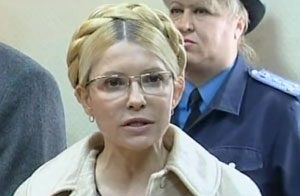 Colpevole e condannata a sette anni di carcere. Il giudice non aveva ancora finito di leggere la sentenza che Julija Timoshenko gridava già alle televisioni di tutto il mondo la sua rabbia. L’ex primo ministro ucraino è una donna tutta d’un pezzo. Con lei le mezze misure non valgono: o la si ama o la si odia. Nessun leader politico era mai riuscito a dividere in simil maniera l’Ucraina. “Assistiamo ad un nuovo 1937 – ha urlato in tivù la Timoshenko, indignata, dopo che, per un paio d’ore, aveva sorriso nervosamente ai presenti in aula -. Ucraini, alzatevi e lottiamo insieme contro la dittatura. Porterò il mio caso alla Corte europea dei diritti umani”.
Colpevole e condannata a sette anni di carcere. Il giudice non aveva ancora finito di leggere la sentenza che Julija Timoshenko gridava già alle televisioni di tutto il mondo la sua rabbia. L’ex primo ministro ucraino è una donna tutta d’un pezzo. Con lei le mezze misure non valgono: o la si ama o la si odia. Nessun leader politico era mai riuscito a dividere in simil maniera l’Ucraina. “Assistiamo ad un nuovo 1937 – ha urlato in tivù la Timoshenko, indignata, dopo che, per un paio d’ore, aveva sorriso nervosamente ai presenti in aula -. Ucraini, alzatevi e lottiamo insieme contro la dittatura. Porterò il mio caso alla Corte europea dei diritti umani”.
L’ex premier è stata condannata per abuso di potere e malversazione. Nel gennaio 2009, dopo l’ennesima guerra del gas con Mosca condita da estenuanti trattative, ha concordato con Putin un contratto che avrebbe procurato all’Erario nazionale circa 200 milioni di dollari di danni.
L’esito del processo, secondo numerosi specialisti, era scontato. Gli oligarchi ucraini, a suo tempo, avrebbero promesso di fargliela pagare all’“eroina” della rivoluzione “arancione” dell’autunno 2004. Troppe volte la Timoshenko, in carica come primo ministro, aveva messo loro i bastoni tra le ruote, facendo perdere importanti affari. Ed il presidente Janukovich, suo acerrimo nemico, è il paladino di alcuni di questi oligarchi.
Alle notizie provenienti da Kiev, pronte sono state le reazioni negative di Unione europea e Russia. Bruxelles, attraverso un portavoce comunitario, ha messo in chiaro che questo verdetto rischia di compromettere la decisione di concedere all’Ucraina lo status di Paese associato all’Ue. “Non capisco perché le abbiano dato sette anni”, ha osservato il premier Putin, che ha rimarcato ironicamente che come cifra (sette) non è male. La Timoshenko, ha ricordato il leader russo “non è un’amica, ma un avversario politico, poiché è sempre stata orientata verso Occidente”.
Adesso vi è il serio pericolo che ricominci lo scontro tra Kiev e Mosca per il gas con tutte le conseguenze del caso per gli approvvigionamenti europei. L’80% del metano russo diretto all’Ue passa appunto per l’ex repubblica sovietica. Il presidente Janukovich ha già reso noto di volere assolutamente ridiscutere il contratto siglato dalla Timoshenko nel 2009.
Sullo sfondo di questa resa dei conti interna vi è la lotta per la collocazione geopolitica della strategica Ucraina. Putin la vuole a tutti i costi all’interno della prossima nascente Unione eurasiatica, che dovrebbe controbilanciare ad Est l’Ue. Senza Kiev, Mosca lo sa bene, non si può ricostruire l’impero. Di certo non l’Urss, ma un gruppo economico compatto, in grado di competere al tempo della globalizzazione. Il progetto unionista è centrale nel programma del terzo mandato presidenziale di Vladimir Putin. Janukovich sa perfettamente che gli ucraini non ne vogliono più sapere di Mosca e guardano ad Occidente, ma l’Ue si intestardisce a tenere chiuse le sue porte.
Tornando al verdetto di Kiev, l’ex presidente Jushenko ha affermato che quello della Timoshenko “non è un processo politico”. L’ex premier non si consultò con lui per la firma dell’accordo coi russi. Janukovich ha invece tentato di buttare acqua sul fuoco, asserendo che il giudice ha compiuto il suo dovere applicando il vecchio Codice del 1962. L’ex premier, che viene chiamata la “Khodorkovskij” ucraina ha, però, la possibilità dell’appello.
Welcome
We are a group of long experienced European journalists and intellectuals interested in international politics and culture. We would like to exchange our opinion on new Europe and Russia.
Categories
- Breaking News (11)
- CIS (129)
- Climate (2)
- Energy&Economy (115)
- EU Eastern Dimension (85)
- Euro 2012 – Sochi 2014 – World Cup 2018, Sport (43)
- Euro-Integration (135)
- History Culture (198)
- International Policy (261)
- Military (74)
- Interviews (18)
- Italy – Italia – Suisse (47)
- Odd Enough (10)
- Poland and Baltic States (126)
- Religion (31)
- Russia (421)
- Survey (4)
- Turning points (4)
- Ukraine (176)
- Российские страницы (113)
Archives
- November 2020
- October 2020
- September 2020
- August 2020
- July 2020
- May 2020
- April 2020
- March 2020
- January 2020
- December 2019
- November 2019
- October 2019
- September 2019
- August 2019
- July 2019
- June 2019
- May 2019
- April 2019
- March 2019
- February 2019
- December 2018
- November 2018
- October 2018
- September 2018
- August 2018
- July 2018
- June 2018
- May 2018
- April 2018
- March 2018
- February 2018
- January 2018
- December 2017
- November 2017
- October 2017
- September 2017
- August 2017
- July 2017
- May 2017
- March 2017
- January 2017
- December 2016
- November 2016
- October 2016
- September 2016
- July 2016
- June 2016
- May 2016
- April 2016
- February 2016
- January 2016
- November 2015
- October 2015
- September 2015
- June 2015
- April 2015
- March 2015
- February 2015
- January 2015
- December 2014
- November 2014
- October 2014
- September 2014
- August 2014
- July 2014
- June 2014
- May 2014
- April 2014
- March 2014
- February 2014
- January 2014
- December 2013
- November 2013
- October 2013
- September 2013
- August 2013
- July 2013
- June 2013
- May 2013
- April 2013
- March 2013
- February 2013
- January 2013
- December 2012
- November 2012
- October 2012
- September 2012
- August 2012
- July 2012
- June 2012
- May 2012
- April 2012
- March 2012
- February 2012
- January 2012
- December 2011
- November 2011
- October 2011
- September 2011
- August 2011
- July 2011
- June 2011
- May 2011
- April 2011
- March 2011
- February 2011
- January 2011
- December 2010
- November 2010
- October 2010
- September 2010
- August 2010
- July 2010
- June 2010
- May 2010
- April 2010
- March 2010
- February 2010
- January 2010
- December 2009
- November 2009
- October 2009
- September 2009
- August 2009
Our books




